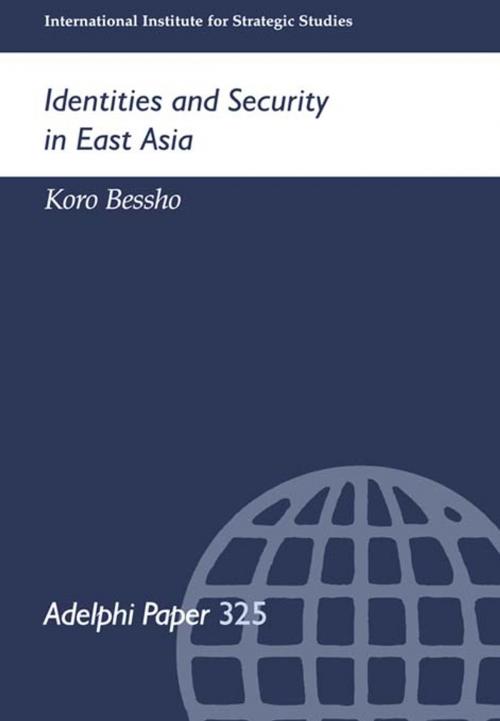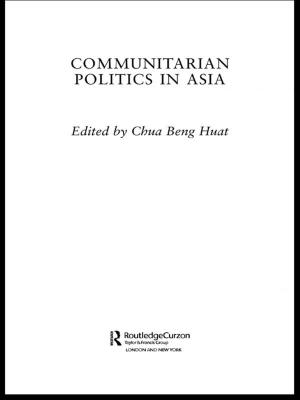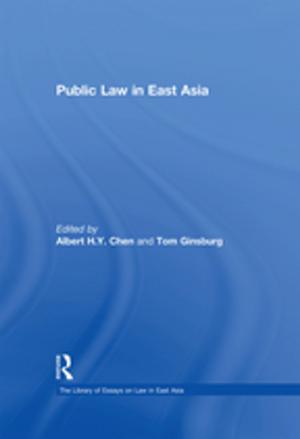Identities and Security in East Asia
Nonfiction, Social & Cultural Studies, Political Science, Politics, Arms Control, History, Military| Author: | Koro Bessho | ISBN: | 9781136060205 |
| Publisher: | Taylor and Francis | Publication: | September 13, 2013 |
| Imprint: | Routledge | Language: | English |
| Author: | Koro Bessho |
| ISBN: | 9781136060205 |
| Publisher: | Taylor and Francis |
| Publication: | September 13, 2013 |
| Imprint: | Routledge |
| Language: | English |
East Asia has been relatively free from large-scale conflict in the 1990s, but the absence of security organisations or even of a sense of community within the region has raised doubts about its future security. China and Japan are likely to bear much of the responsibility for maintaining stability, but both countries have been reluctant to adopt a leadership role. South-east Asian states have been willing to take the initiative outside of their sub-region, but they possess neither the resources nor the authority to lead the whole of East Asia. In the long term, the ability to organise the region depends on greater clarity in the identity of leading states in the region, and of the region as a whole.
This paper analyses the way in which issues of identity have affected the actions of the key players, and assesses future challenges and possibilities in the search for regional security. It concludes that:
Through the Association of South-East Asian Nations (ASEAN), South-east Asian states have developed a sense of confidence and unity. However, ASEAN’s need to safeguard its newly acquired identity means that it has not exported the ‘ASEAN way’ to the wider region of East Asia or the Asia-Pacific. The greater diversity that enlargement will bring and the effects of the crisis since 1997 are likely to make the Association’s defensive instincts still more resistant to change.
In the 1990s, Japan has sought to redefine its identity, both in terms of its past and of its post-war values such as pacifism and human rights. This process has compelled Japan to face Asia more squarely, and has increased the country’s self-assurance. As a result, it may become more willing to take the initiative in political and security, as well as economic, areas.
For China, nationalism has become more important, just as communism’s position as the country’s unifying ideology has eroded. Beijing has tried to change the status quo in a forceful way. By the close of the 1990s, however, China has become increasingly willing to act as a responsible world power. A key test of this transformation will be Beijing’s treatment of the Taiwan question.
The prospects for regional stability depend on Japan’s ability to reform and return to growth. The most pressing task is to revitalise East Asia’s economies. A return to prosperity would encourage China’s reform and opening process; lessen Japan’s introspection; make disagreements between the South-east Asian states less acute; and allow the Asia-Pacific region as a whole to move beyond both the triumphalism of the East Pacific and the resentment of the West.
East Asia has been relatively free from large-scale conflict in the 1990s, but the absence of security organisations or even of a sense of community within the region has raised doubts about its future security. China and Japan are likely to bear much of the responsibility for maintaining stability, but both countries have been reluctant to adopt a leadership role. South-east Asian states have been willing to take the initiative outside of their sub-region, but they possess neither the resources nor the authority to lead the whole of East Asia. In the long term, the ability to organise the region depends on greater clarity in the identity of leading states in the region, and of the region as a whole.
This paper analyses the way in which issues of identity have affected the actions of the key players, and assesses future challenges and possibilities in the search for regional security. It concludes that:
Through the Association of South-East Asian Nations (ASEAN), South-east Asian states have developed a sense of confidence and unity. However, ASEAN’s need to safeguard its newly acquired identity means that it has not exported the ‘ASEAN way’ to the wider region of East Asia or the Asia-Pacific. The greater diversity that enlargement will bring and the effects of the crisis since 1997 are likely to make the Association’s defensive instincts still more resistant to change.
In the 1990s, Japan has sought to redefine its identity, both in terms of its past and of its post-war values such as pacifism and human rights. This process has compelled Japan to face Asia more squarely, and has increased the country’s self-assurance. As a result, it may become more willing to take the initiative in political and security, as well as economic, areas.
For China, nationalism has become more important, just as communism’s position as the country’s unifying ideology has eroded. Beijing has tried to change the status quo in a forceful way. By the close of the 1990s, however, China has become increasingly willing to act as a responsible world power. A key test of this transformation will be Beijing’s treatment of the Taiwan question.
The prospects for regional stability depend on Japan’s ability to reform and return to growth. The most pressing task is to revitalise East Asia’s economies. A return to prosperity would encourage China’s reform and opening process; lessen Japan’s introspection; make disagreements between the South-east Asian states less acute; and allow the Asia-Pacific region as a whole to move beyond both the triumphalism of the East Pacific and the resentment of the West.















